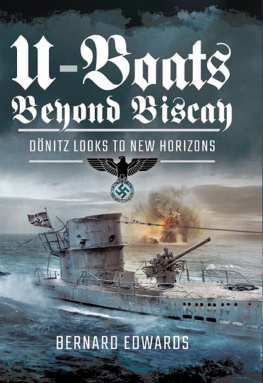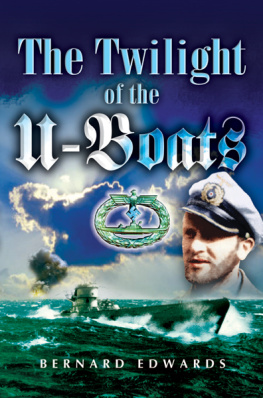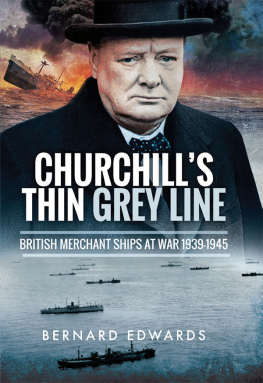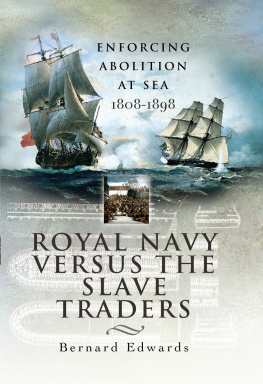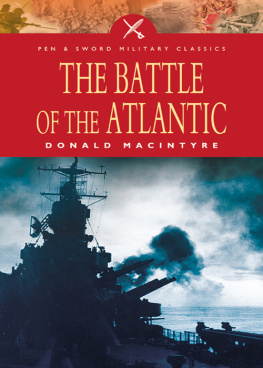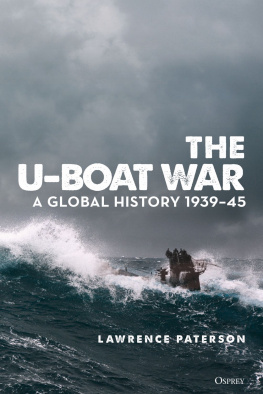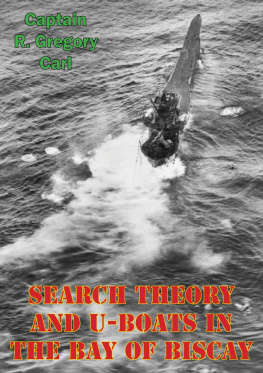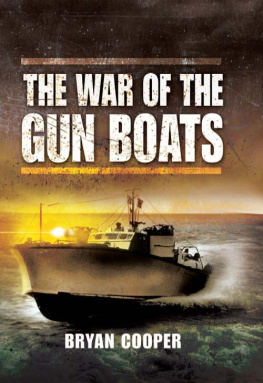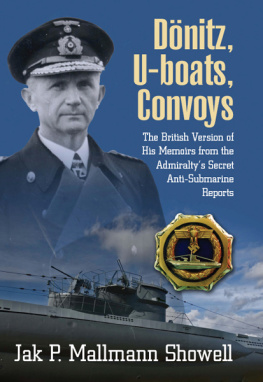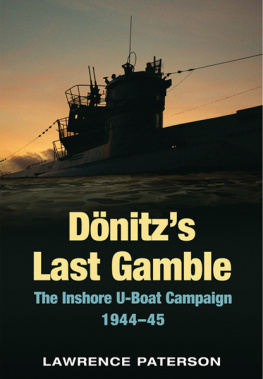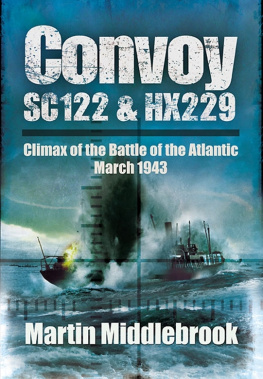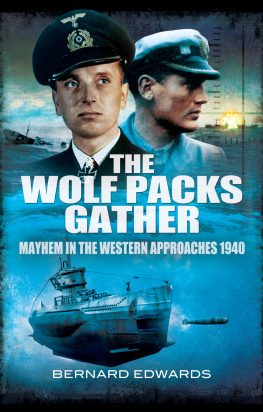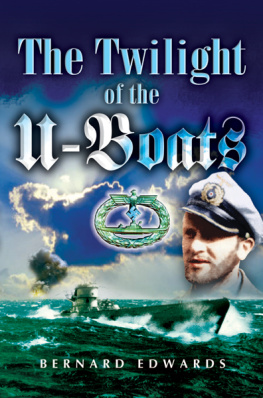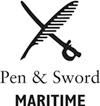
U-Boats Beyond Biscay
Other books by Bernard Edwards
Masters Next to God
They Sank the Red Dragon
The Fighting Tramps
The Grey Widow Maker
Blood and Bushido
SOS Men Against the Sea
Salvo!
Attack and Sink
Dnitz and the Wolf Packs
Return of the Coffin Ships
Beware Raiders!
The Road to Russia
The Quiet Heroes
The Twilight of the U-boats
Beware the Grey Widow Maker
Death in the Doldrums
Japans Blitzkrieg
War of the U-boats
Royal Navy Versus the Slave Traders
The Cruel Sea Retold
War Under the Red Ensign 1914-1918
The Wolf Packs Gather
Convoy Will Scatter
U-Boats Beyond Biscay
Dnitz Looks to New Horizons
Bernard Edwards
First published in Great Britain in 2017 by
PEN & SWORD MARITIME
An imprint of
Pen & Sword Books Ltd
47 Church Street
Barnsley
South Yorkshire
S70 2AS
Copyright Bernard Edwards, 2017
ISBN 978 1 47389 6 055
eISBN 978 1 47389 6 079
Mobi ISBN 978 1 47389 6 062
The right of Bernard Edwards to be identified as Author of this work has been asserted by him in accordance with the Copyright, Designs and Patents Act 1988.
A CIP catalogue record for this book is available from the British Library.
All rights reserved. No part of this book may be reproduced or transmitted in any form or by any means, electronic or mechanical including photocopying, recording or by any information storage and retrieval system, without permission from the Publisher in writing.
Pen & Sword Books Ltd incorporates the Imprints of Pen & Sword Aviation, Pen & Sword Family History, Pen & Sword Maritime, Pen & Sword Military, Pen & Sword Discovery, Pen & Sword Politics, Pen & Sword Atlas, Pen & Sword Archaeology, Wharncliffe Local History, Wharncliffe True Crime, Wharncliffe Transport, Pen & Sword Select, Pen & Sword Military Classics, Leo Cooper, The Praetorian Press, Claymore Press, Remember When, Seaforth Publishing and Frontline Publishing.
For a complete list of Pen & Sword titles please contact
PEN & SWORD BOOKS LIMITED
47 Church Street, Barnsley, South Yorkshire, S70 2AS, England
E-mail:
Website: www.pen-and-sword.co.uk
For those who voyage in deep waters
Now quietly falls the night whose crimson dawn
Will find us far from here. The unmarked oceans ways
Will know our passing: mornings golden haze
Open to greet us, and the mellowed horn
Of kinder winds than these cold northern airs
Blow softer notes in welcome.
Michael Fitzgerald Page
Preface
A great deal has been written about the U-boats that stalked the North Atlantic convoy lanes, hunting in packs and preying on the merchantmen huddled together for mutual protection. Directed from Lorient in southern Brittany through the powerful transmitters of Norddeich Radio, they reaped a rich and continuous harvest and came within an ace of cutting the vital supply lines that kept the granaries and arsenals of Britain stocked.
It had not always been so. At the outbreak of war in September 1939 Admiral Dnitz had, at the most, thirty U-boats operational, and only six to eight of these would be at sea at any one time. Of necessity, their activities were restricted mainly to the North Sea and British coastal waters, and they rarely ventured past 12 west. This changed when France fell in the summer of 1940 and a whole range of ports in the Bay of Biscay became available as bases. No longer did the U-boats have to make the hazardous 450-mile-long passage around the north of Scotland to enter the Atlantic. This meant more boats at sea more often, and Dnitzs grey wolves now ranged 1,000 miles deep into the Atlantic, while the Royal Navy was unable to supply escorts much beyond the Western Approaches. This was a recipe for disaster, and resulted in the U-boats sinking 500,000 tons of precious Allied shipping a month, every month.
With more boats at his disposal, Admiral Dnitz now looked over the far horizons, to the western Atlantic, the tree-lined coasts of Africa and the shallow waters of the Mediterranean, where Allied merchantmen sailed alone and unprotected. Here was another harvest to be gathered in, and it was a job for the longrange U-boats, the silent hunter killers, sometimes operating alone, on occasions with others, but always far from their bombproof concrete burrows on the coast of Biscay. This is their story.
CHAPTER ONE
Far Away Places
U-111 was a lone hunter, one of the shadowy outriders of Hitlers U-boat arm operating beyond the convoy routes. A Type IXB longrange boat, she was well equipped for the work in hand, having a top speed of 18 knots on the surface and a cruising range of 12,000 miles at 10 knots. Her armament, too, was formidable: four bow and two stern torpedo tubes, a 105mm deck gun and, for defence against air attack, a quadruple-barrelled 20mm AA gun mounted abaft her conning tower. She was crewed by four officers, three chief petty officers, fourteen petty officers and thirty ratings, and carried one officer in training. In command was Kapitnleutnant Wilhelm Kleinschmidt.
Thirty-four-year-old Kleinschmidt had served seven years in German merchant ships before transferring to the Kriegsmarine in the early 1930s. Sailing first in motor torpedo boats and then as torpedo officer in light cruisers, he joined the U-boat arm in the spring of 1940 with a wealth of real sea-going experience behind him. After training, and one short war patrol in U-124 with Georg-Wilhelm Schulz, he was given command of the newly-commissioned U-111.
Kleinschmidt was described as being a most careful U-boat captain, and there seems to be no doubt that his service in merchant ships, where the safety of ship, cargo and crew is paramount, had a lasting influence on his approach to command. While he was a competent commander, he was not one to take those unnecessary risks which were really the stock-in-trade of a successful U-boat captain. Some said he was too old for the job, and they might well have been right. What is quite certain is that Kleinschmidt was sailing at a disadvantage in U-111, in that he had with him a largely inexperienced crew. His first lieutenant, 24-year-old Leutnant-zur-See Helmut Fuchs, had previously completed only one war cruise, and of U-111s petty officers and ratings only five had any experience of submarines before joining the boat. Coupled with this, Kleinschmidt had on board an officer in training for command, Korvettenkapitn Hans-Joachim Heinecke, who was his senior in rank. And to compound an already uncomfortable situation, U-111s junior watch officer, Oberleutnant-zur-See Friedrich-Wilhelm Rsing, happened to be the brother of the influential Korvettenkapitn Hans Rsing, formerly commanding officer of the 3rd U-boat Flotilla. There were too many watchful eyes at Kleinschmidts back.
On his first war patrol in U-111, beginning in Wilhelmshaven on 5 May 1941, Kleinschmidt confounded his detractors by sinking two British merchantmen and damaging another in his first three weeks at sea. He opened his score with the 5,170-ton West Hartlepool steamer Somersby , sailing with the 28-ship convoy SC 30. The convoy ran into dense fog south of Iceland, and the Somersby straggled astern. Kleinschmidt put three torpedoes into her and she capsized and sank, taking her cargo of 8,000 tons of grain to the bottom with her. Secondly, Kleinschmidt torpedoed the 13,037-ton Eagle Oil tanker San Felix s hortly after she dispersed from Convoy OB 322. The tanker was hit by one of two torpedoes fired by Kleinschmidt and was last seen with a heavy list disappearing into a rain squall. Being then in ballast, the San Felix did not sink, but she would spend the next five months in port under repair. Lastly, Kleinschmidt disposed of the 4,813-ton Whitby steamer Barnby , carrying 7,250 tons of bagged flour from St Johns, New Brunswick to Hull. She sank off Iceland on 22 May 1941. It is worthy of note that of the 131 crew members carried by these three ships, only three were lost. Such a low casualty rate may have been in part due to Wilhelm Kleinschmidts entrenched regard for his fellow merchant seamen.
Next page
